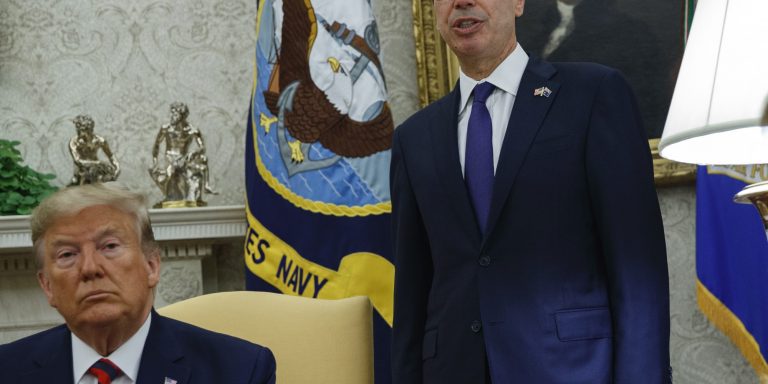INTELBRIEF
October 9, 2019
IntelBrief: U.S. Sanctions Approach a Blockade

- On September 20, the Trump administration sought to completely shut Iran out of the international financial system by imposing new sanctions on its Central Bank.
- The Central Bank sanctions are complicating Iran’s efforts to import food and medicine, producing effects comparable to a blockade of the country.
- The move continues a trend in which the Trump administration uses terrorism-related sanctions to pressure Iran’s civilian economy.
- The Central Bank sanctions could prompt further Iranian provocative actions such as the September 14 attack on Saudi critical energy infrastructure.
.
On September 20, the Trump administration announced the latest step in its campaign to apply ‘maximum pressure’ on Iran’s economy to compel Iran’s leadership to negotiate a more favorable nuclear deal than the 2015 multilateral agreement that the Trump administration abandoned. The Treasury Department designated Iran’s Central Bank as a terrorism-supporting entity under Executive Order 13224. The new sanctions go beyond existing provisions that bar all U.S. transactions with Iran’s Central Bank or penalize foreign banks that deal with it. Simultaneously, under the same Executive Order, the Treasury Department sanctioned an Iranian sovereign wealth fund, the National Development Fund of Iran, on the grounds that it is furnishing funds to Iran’s Islamic Revolutionary Guard Corps (IRGC). The fund primarily has been used by its leadership to pay for rural electrification and agricultural projects.
The designation of Iran’s Central Bank as a terrorism supporter continues a trend exhibited in the past several months in which the Trump administration has designated a wide range of Iran-related economic actors as terrorist entities. The administration asserts that any Iranian entity that provides funding for Iran’s Islamic Revolutionary Guard Corps – Qods Force (IRGC-QF), the unit of the IRGC that supports pro-Iranian governments and Iranian proxies in the region, should be designated a terrorism supporter. Typically, it is more difficult for any administration to justify ‘delisting’ a terrorism entity than it is to remove sanctions on entities designated for such activities as proliferation or human rights abuses. Hundreds of Iranian entities were delisted from sanctions to implement the 2015 multilateral nuclear deal with Iran, but none was an entity designated on the grounds of supporting terrorism. And, perhaps most significantly, a terrorism supporting sanctions (terrorism) designation does not contain a humanitarian exemption, which many other sanctions regimes include to avoid undue harm on civilian populations in dire need of humanitarian assistance.
As was likely intended, the additional sanctions on the Central Bank have had a chilling effect on global banks and firms that hold Iranian Central Bank accounts or conduct transactions with it. And the effect on Iran is dramatic because much of Iran’s nearly $100 billion in foreign exchange assets is held in Central Bank accounts around the world, and the Central Bank is involved in many currency clearing operations that Iran engages in. Therefore, the new sanctions essentially shut the Central Bank out of the international financial system, including for the processing of transactions for humanitarian items (food, medicine, and medical equipment). As a result, in early October, press reports indicated that large numbers of shiploads carrying agricultural goods were unable to offload at Iran’s ports because of difficulties arranging payments for their cargo. The payments difficulties illustrate the degree to which global banks are shying away from any transaction with Iran, because of the potential to trigger U.S. sanctions and/or cause other reputational and financial damage.
By not providing a blanket humanitarian exception, the new Central Bank sanctions arguably amount to a virtual U.S.-led blockade of the country. A blockade is considered an act of war under international law, but the Trump administration argues that this analogy is inappropriate because U.S. ships are not physically enforcing a blockade of Iranian ports or denying Iran the use of its airspace. Nonetheless, the effect is similar. The humanitarian effects of the new Central Bank sanctions are likely to attract the attention of human rights and humanitarian groups worldwide, creating substantial sympathy for Iran. That pressure could cause the Trump administration to issue new guidance making clear that transactions with the Iranian Central Bank for purely humanitarian items will not be sanctioned, although some close observers see this as unlikely. Absent such guidance, the potential for Iran to undertake action that leads to hostilities with the United States is substantial. With well-armed proxies active throughout the Middle East, Tehran has a wide range of options to produce a region-wide conflict that even the extensive deployment of U.S. military power would have difficulty bringing to a clear and favorable conclusion.
.
For tailored research and analysis, please contact: info@thesoufancenter.org